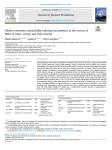Muhirwa F., Li L., Laspidou C. (2025). Global ecosystem sustainability indexing and patterns in the success of SDGs of water, energy and food security. Journal of Cleaner Production, 20/07/2025, vol. 516, p. 145830.
https://doi.org/10.1016/j.jclepro.2025.145830
https://doi.org/10.1016/j.jclepro.2025.145830
| Titre : | Global ecosystem sustainability indexing and patterns in the success of SDGs of water, energy and food security (2025) |
| Auteurs : | F. Muhirwa ; L. Li ; C. Laspidou |
| Type de document : | Article |
| Dans : | Journal of Cleaner Production (vol. 516, July 2025) |
| Article en page(s) : | p. 145830 |
| Langues : | Anglais |
| Langues du résumé : | Anglais |
| Catégories : |
Catégories principales 08 - ALIMENTATION ; 8.3 - Politique et Sécurité AlimentaireThésaurus IAMM SECURITE ALIMENTAIRE ; DEVELOPPEMENT DURABLE ; INDICATEUR DE DEVELOPPEMENT DURABLE ; ECOSYSTEME ; DURABILITE |
| Résumé : | Implementing the United Nations Sustainable Development Goals (SDGs) in the water, energy, and food (WEF) sectors requires addressing complex global challenges related to balancing resource demand and ecosystem sustainability. This study introduces a hybrid composite index for assessing ecosystem sustainability and progress toward WEF-related SDGs from 2000 to 2020 across countries worldwide. The index is based on two fundamental concepts: eco-efficiency, which quantifies sustainable resource utilization, and ecological resilience, which evaluates strategies to mitigate global ecosystem threats. The findings reveal modest improvements in food security (SDG 2), though the ecosystem-based food security (EFS) sub-index declined from 1.2 to 0.9, falling below the critical threshold of 1 and posing risks to 62 % of countries globally, with 80 % of sub-Saharan African and Middle Eastern countries most impacted. The ecosystem-based water security (EWS) sub-index showed moderate progress, increasing from 1.2 to 1.71, yet 39 % of countries still fall below threshold levels. Although ecosystem-based energy security (EES) remains above the critical threshold, it declined from 3.4 to 3.1. Many factors, including insufficient ecological resilience to counter ecosystem stressors, contribute to the overall declining trends. Integrating eco-efficient practices and resilience-building measures presents promising solutions. The study further identifies 27 natural and 11 human-made ecosystem elements as opportunities to improve WEF security and bolster resilience capacities. |
| Cote : | En ligne |
| URL / DOI : | https://doi.org/10.1016/j.jclepro.2025.145830 |







